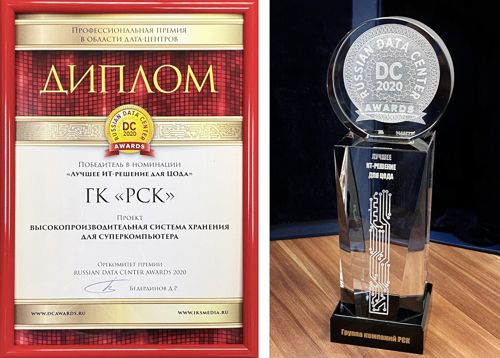RSC Group With High-Performance Storage System for HPC
Project receives Russian DC Awards 2020.
This is a Press Release edited by StorageNewsletter.com on December 21, 2020 at 2:21 pmRSC Group, a Russian developer and integrator of high-dense and energy-efficient solutions for HPC, data centers, cloud platforms, has received Russian DC Awards 2020 in The best IT solution for data centers nomination at the award ceremony in Moscow, Russia, hold on December 10, 2020.

Russian company won with its project High-performance storage system for HPC deployed this year at the Joint Institute for Nuclear Research (JINR) in Dubna, Moscow region, Russia.
“It’s remarkable that RSC got this prestigious industry award almost at its 11th anniversary we celebrated on December 3rd, 2020. Since its foundation RSC Group has completed over 30 end-customer projects and registered 15 patents on inventions and utility models for its products and technologies not only in Russia, but also in Europe, USA, China and Japan,” said Alexey Shmelev, COO, RSC.
High-speed storage system for Govorun HPC in JINR has R/W speed of the parallel file system exceeding 300GB/s, and it is based on RSC disaggregated composable storage architecture. This was achieved with RSC hardware-software solutions as standard technologies with separate storage systems would involve much greater costs.
Implementation of storage on-demand approach enables re-configuration of a specific storage system for each workload task with all required properties (capacity, speed, file system, persistence, reliability and security), which would be impossible to achieve with standard monolithic way to work with HPC storage.
RSC’s patented technology of cross-connection of network disks and N+M redundancy of storage servers ensures reliability of the storage system.
Govorun HPC in JINR
First hyper-converged 100% hot water cooled Govorun HPC deployed at Joint Institute for Nuclear Research holds ≠22 position in the new edition of global IO500 rating of the best performing HPC-level storage systems (as it was announced at SC20 HPC exhibition).
These results were achieved due to distributed and composable RSC Storage on-demand system. It is based on Intel SSD and Optane SSD with NVMe interface. When Govorun HPC was commissioned and operational at JINR in June 2018, it occupied the high ≠9 place in the global IO500 rating. This system also has ≠11 position in local Top50 rating of the most powerful HPCs in Russia and CIS region (September, 2020).
Govorun HPC of the Joint Institute for Nuclear Research is a joint project of the Theoretical Physics Laboratory (TPL) named after N.N. Bogolyubov and Laboratory of IT (LIT) supported by JINR board. It was deployed in 2018 with help of specialists from RSC Group and Intel Corporation.
The initial installation the Govorun HPC enabled to perform a lot of complex and resource-intensive simulations in the field of quantum chromodynamics patterns for research of hadronic matter properties at high energy density and barion charge and in presence of extra strong electromagnetic fields. It also accelerated gen and reconstruction of events for planned experiments for coming NICA ion collider.
HPC boosted calculation speed of radiation safety of experimental JINR units; accelerated radiation biology research and other applied science problems at JINR; supported in international collaborations. Research results have been published in over 50 science journals, including Nature Physics.
JINR HPC was upgraded twice in 2019-2020. The new hyper-converged and software-defined system has total theoretical peak performance of 860 tflops with double precision. Its novel approach has features to make it adaptable for specific user workloads and maximize utilization of HPC’s resources.
The system has a number of different node types and allows flexibility of composable configurations:
- Base computing nodes: Dual-socket nodes with 2 high speed NVMe drives based on Intel Xeon Scalable 2nd gen processors (Intel Xeon Gold 8268), Intel Server Board S2600BP and 2TB Intel SSD DC P4511 drives with NVMe interface in M.2 form-factor, as well as one 100Gb/s Intel Omni-Path adapter. These nodes are the building blocks for standard computing and distributed storage-on-demand systems.
- Enhanced storage functionality nodes: Base dual-socket nodes with 12 extra M.2 slots for fast NVMe disks and PCIe bus controllers supporting the advantages of storage technologies such as SDS, NVMe-oF, M.2 Hot Swap, etc. Nodes are based on Intel Xeon Scalable 2nd gen processors (Intel Xeon Gold 8268), Intel Server Board S2600BP, 2x100Gb/s Intel Omni-Path adapters and:
- 12x high-speed Intel SSD DC P4511 2TB M.2 drives with NVMe interface for high-speed static and storage-on-demand systems;
- Or 12x high-speed low latency Intel SSD DC Optane P4801X 375GB M.2 drives with NVMe interface. These nodes can be used for high-capacity systems (up to 3.4TB per node) or as fast parallel storage component (e.g. MDS in Lustre).
- Nodes for hyper-massive parallel tasks based on 72-core Intel Xeon Phi 7290 coprocessors, Intel Server Board S7200AP, Intel SSD DC S3520 M.2 drives with SATA interface.
Hyper-converged approach resulted in high-speed storage system for Govorun with leading characteristics and cost-efficiency.












 Subscribe to our free daily newsletter
Subscribe to our free daily newsletter
